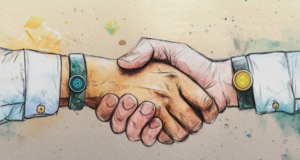Palau Launches a Digital Residency Program

Nestled within 250 petite volcanic islands, the Palau archipelago thrives entirely on tourism. Every year, droves of surfing and diving enthusiasts flock to this idyllic Micronesian haven, basking amidst coconut palms on untouched white sands.
On this page
Why is Palau aiming to become a “Bitcoin haven”?
The government of Palau is grappling with a significant challenge: the scarcity of physical cash. Although the bulk of the budget is derived from tourism sector taxes, the banking amenities on the islands are somewhat lacking. The central islands, where branches of the Bank of Hawaii Palau and Bank of Guam Palau operate, manage to support electronic transactions. However, the modern conveniences of banking fade on the more isolated islands. As a result, visitors often find themselves carrying substantial amounts of cash if they intend to explore these less central regions.
Increasingly, Palau's regulators hear from local business owners, be it landlords, guides, or café proprietors. A common complaint is that their customers often limit their spending due to a shortage of physical currency. Furthermore, there's a challenge with coinage: transporting smaller denominations to far-flung islands proves costly.
The beautiful islands of Palau. Source: atlastour
Adding to these concerns, this tourist destination is still rebounding from the pandemic and is in dire need of additional resources to modernize its infrastructure. Taking a bold step forward, the government of the Republic has authorized cryptocurrency transactions and rolled out a digital residency program.
How to Acquire Digital Residency in Palau
- Submit an application for residency at the Ngerulmud office in Melekeok.
- Await a confirmation from the blockchain system acknowledging your application's processing.
- Secure your RNS ID. This serves as an identification, akin to the Palauan passport, and it's kept on the national distributed ledger.
- Collect the tangible version of this document, which you can do at your convenience.
Presentation on Palau's Digital Residency Program. Source: palaugov
Digital residency in Palau allows for a stay ranging from 6 to 10 months each year. Moreover, those with an RNS ID can run businesses on the islands without the obligation of paying income tax.
This document can also facilitate online purchases and be used for reservations on accommodation websites. It possesses all the essential features of the country's passport, making it suitable for the KYC procedures on any crypto exchange, as well as for opening bank accounts or registering a company within the Republic of Palau.
The introduction of the RNS Points program is another highlight. This unique reward system for digital residents lets them accumulate activity points which can then be redeemed for hotel discounts, flight tickets, or car rentals on the islands.
Opting for Palau's digital citizenship is economically advantageous: $248 for a year, $1039 for a five-year duration, and $2039 for a decade. It's a compelling offer!
The island nation's government hopes this initiative will not only lure more tourists but also prolong their visa-free stays.
All proceeds from the sale of these digital passports will be invested in the enhancement of the islands' infrastructure and a broad tax reformation.
Notably, tech giants like Vitalik Buterin and Tim Draper have taken the lead, becoming the first digital citizens of Palau.
For an in-depth guide on how to embark on this digital residency journey in these idyllic islands, further information is available here.
The content on The Coinomist is for informational purposes only and should not be interpreted as financial advice. While we strive to provide accurate and up-to-date information, we do not guarantee the accuracy, completeness, or reliability of any content. Neither we accept liability for any errors or omissions in the information provided or for any financial losses incurred as a result of relying on this information. Actions based on this content are at your own risk. Always do your own research and consult a professional. See our Terms, Privacy Policy, and Disclaimers for more details.



























